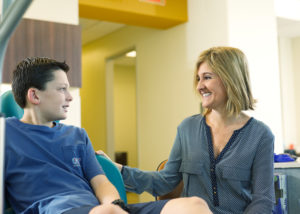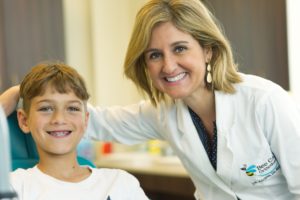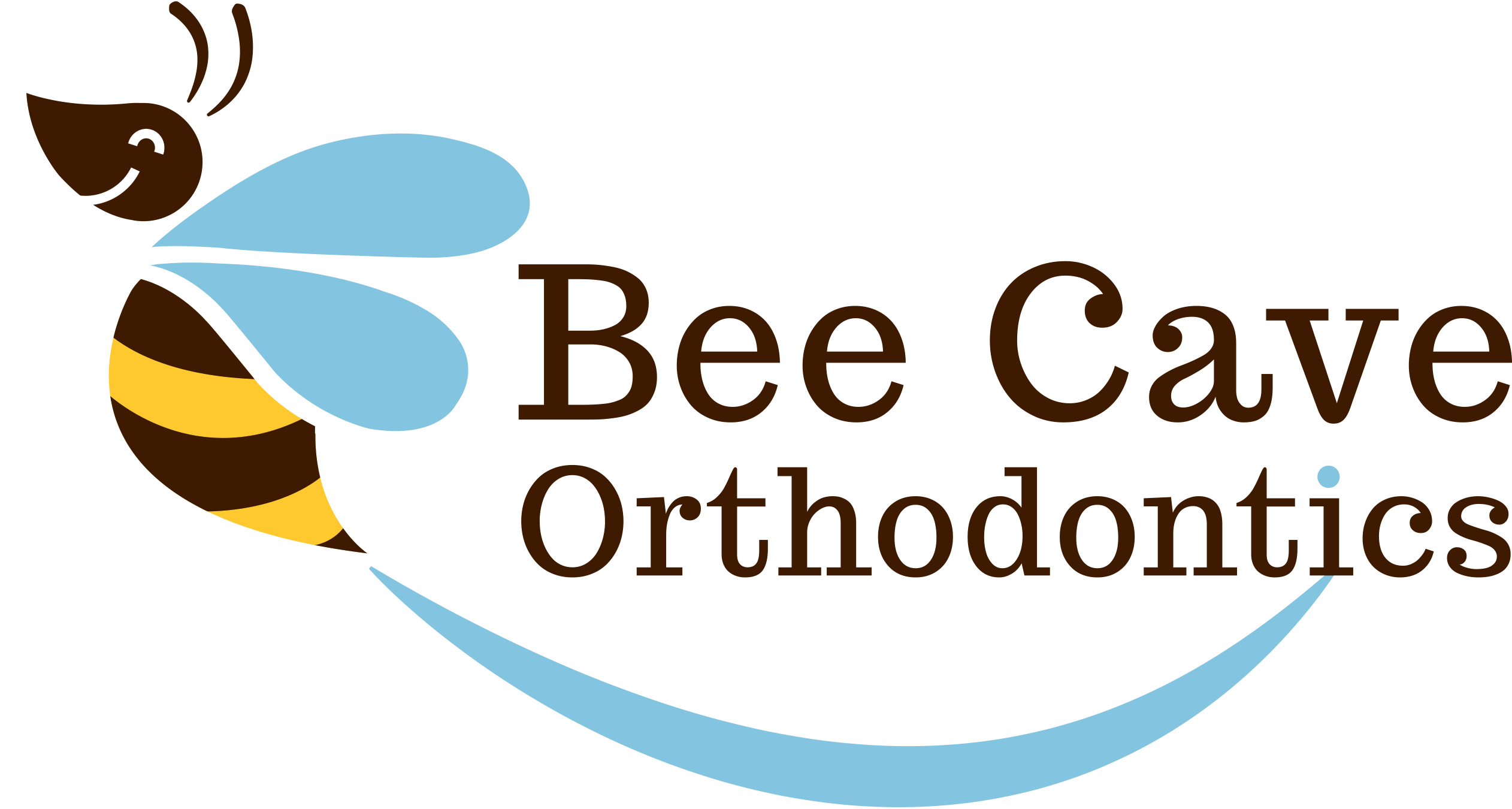Complex Orthodontics for Special Needs and Medical Issues
We welcome all patients, no matter how complex the case. Our team is trained and equipped to treat patients with special needs, autism, cleft lip and palate, craniofacial syndromes and complex medical issues such as tumors or traumas.
Orthodontic treatments for patients born with complex medical issues or special needs are more intricate than conventional orthodontics. Dr. Da Silveira has been actively involved in treating special needs and complex cases throughout her career.
Expert Care for Medical Issues
 Dr. Da Silveira was an assistant professor and orthodontist in Chicago at the University of Illinois Chicago Craniofacial Center and was part of the Shriner’s Hospital Craniofacial Team. She moved to Austin in 2007 to be the Orthodontist at the Dell Children’s Craniofacial Center and is also a member of the Craniofacial team of Texas.
Dr. Da Silveira was an assistant professor and orthodontist in Chicago at the University of Illinois Chicago Craniofacial Center and was part of the Shriner’s Hospital Craniofacial Team. She moved to Austin in 2007 to be the Orthodontist at the Dell Children’s Craniofacial Center and is also a member of the Craniofacial team of Texas.
Dr. Da Silveira has been a part of multidisciplinary teams treating cleft lip and palate patients from birth into their late teen years. These young patients may need treatment from several specialists such as:
- Craniofacial surgeon
- ENT
- Geneticist
- Neurosurgeon
- Pediatrician
- Pediatric dentist
- Oral surgeon
- Speech and Language Therapists
Dr. Da Silveira has the knowledge and expertise to treat these cases and can make the right referrals to other specialists in town. She has completed craniofacial and orthodontic surgery fellowship training, meaning that she can provide complex treatment that other orthodontists cannot.
Treatment for Cleft Lip, Cleft Palate, and Other Genetic Issues
Treating genetic condition such as cleft lip, cleft palate, Crouzon Syndrome, Apert syndrome, Hemifacial Syndrome, or Treacher Collins syndromes requires coordinated efforts from a team of specialists.
Dr. Da Silveira is skilled in craniofacial treatments and can play an essential part in your child’s treatment time, while also making sure that your child still has the opportunity to have a confident smile.
Standard practice treatment plans are a coordinated effort between a fellowship-trained craniofacial orthodontist and plastic-craniofacial surgeon, as well as other specialists when needed. These specialists will work together to develop a treatment that starts when the genetic abnormalities are discovered and continues through the teen years until your child is done developing.
Dr. Da Silveira has extensive experience treating cleft palate, cleft lip, and any other genetic issue that would benefit from craniofacial orthodontic treatment. She’ll work with the rest of your child’s team to achieve the most functionally and aesthetically pleasing result possible.
The team at Bee Cave Orthodontics is highly skilled in the unique challenges that come with providing orthodontic treatment to patients with genetic and developmental issues. The process is generally longer and more complicated.
Having the right doctor to work with you through the process is important. Dr. Da Silveira has years of training and experience providing orthodontic treatment for patients with cleft lip, cleft palate, and other medical issues.
According to the ACPA, patients with birth defects experience to most significant benefits when all of their care providers work together in interdisciplinary teams to ensure that your child receives the best possible care.
Contact us today to learn more about treatment for patients with cleft palate, cleft lip, and other genetic abnormalities.
Orthodontics for Special Needs Patients
Going to the orthodontist can be hard for patients who have special needs such as Down Syndrome or those with Autism Spectrum Disorder. These patients often have special sensory needs that we’ll take into consideration.
When thinking about orthodontic treatment you may think it’s too much of a hassle for your special needs child, or that it would be too much for them to handle. If your child struggles with dental check-ups or even brushing their teeth, the idea of braces may seem far-fetched.
However, with the right orthodontic team who is willing to work with you and your child, your child can still have a healthy and beautiful smile. With careful planning, the orthodontic process can be as painless as it would be for any patient.
If your child has special needs, their appointment may take longer than a typical appointment would. We have quiet treatment rooms to help your child feel more comfortable. It can also help your child if they see the same doctor and assistant every time they visit, and we’ll do our best to accommodate that.
A common technique that we use to help children understand their treatment is tell-show-do. This doesn’t work as well for children with special needs since they respond to visual communication better than verbal communication in many cases.
We’ll use a tool called a Picture Activity Schedule to explain what we’re doing so your child can understand and relax more easily. You’ll use these photos of each step in the orthodontic process in the days leading up to each appointment. You or your child’s teacher can work through the pictures so your child is prepared for their treatment.
Choosing the Right Orthodontist
 As a parent, you should feel confident that anyone who is caring for your child will give them the best possible care. When looking for an orthodontist, there are a few questions you can ask to make sure that they’ll be able to work well with your child.
As a parent, you should feel confident that anyone who is caring for your child will give them the best possible care. When looking for an orthodontist, there are a few questions you can ask to make sure that they’ll be able to work well with your child.
- Do they have experience working with special needs patients? If so, have they worked with someone who has similar needs to your child? Have they worked with a lot of special needs patients or just a few?
- Does the whole team have the patience and disposition to help your child feel comfortable?
- Are they open to offering longer appointment times, or splitting up longer treatments into a series of appointments?
- Have they used the Picture Activity Schedule before, or are they at least willing to implement it?
As a parent, you can help your child through the process by showing them pictures of the process and appliances can help them prepare for each stage of their treatment. It’s also important for you to work with them on proper brushing and flossing to make sure their teeth stay healthy.
Children with autism can have treatment with traditional braces, but they may struggle to adjust to the feeling of having the appliance in their mouths. They may also struggle with the irritation in their mouth when they first have braces put on.
Will Braces Work for My Child?
For some patients, putting braces on in stages with time to adjust in between each stage makes the process significantly easier. For others, the presence of braces and the responsibility of keeping them clean may be more than they can handle. Deciding against treatment is better than causing additional damage to your child’s teeth.
Every child is different, and while some children with special needs may be able to tolerate and adjust to traditional braces others will not. Dr. Da Silveira has had great success using Invisalign clear aligners for children and adults with special needs.
Since these aligners can be removed to brush, floss, and eat, there is minimal lifestyle adjustment necessary. The clear aligners are also much more comfortable and don’t cause irritation or sores in your child’s mouth.
While special needs patients will still need some time to get used to having the Invisalign trays in their mouth, it’s usually an easier adjustment. Invisalign trays won’t irritate your child’s mouth, and won’t require them to change the way they brush and floss their teeth.
The Bee Cave Orthodontics staff has experience caring for patients will all kinds of special needs and considerations. In addition to the sensory consideration we offer, our offices are wheelchair accessible. Our team will provide these patients with the loving, comfortable care they deserve as we give them their bee happy smiles.
